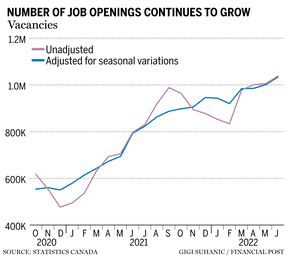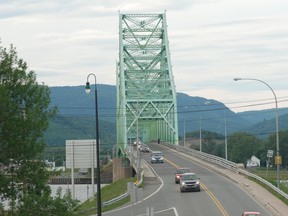Getting newcomers jobs in their respective fields could help tackle the ongoing labour shortage, experts say
Article content
After working in large-scale programs funded by the United Nations and monitoring health projects for some well-known charities in South Asia as a project co-ordinator for nearly a decade, Samia Khan (whose name has been changed to protect her identity) began her career in Canada with an entry-level job at a call centre after arriving last year.
Advertisement 2
Article content
Four months later, Khan, who holds a master’s degree in project management from the EAE Business School in Spain quit her job.
Article content
“It was getting too much to bear,” the 35-year-old permanent resident said. “Jobs I was interested in were either rejecting me or not getting back and the long hours at the call centre drained me, which didn’t allow me to write good applications. I remember getting panic attacks because of all the anxiety.”
Today, Khan works as an admin officer at a company that coaches executives who work for charities. The job doesn’t match her skill set, but she’s hoping she can gradually shift to a more suitable role within the company in a few years.
Some analysts believe putting more effort into identifying the hurdles that prevent newcomers such as Khan from getting jobs in their respective fields could help tackle the ongoing labour crunch.
Advertisement 3
Article content
Canada has a record number of job vacancies and the latest numbers suggest employers have nearly exhausted the pool of available talent for the work on offer. Yet the number of university-educated immigrants working in jobs requiring a university degree fell to 38 per cent in 2016 from 46 per cent in 2001, compared to 60 per cent for Canadian-born workers, according to Statistics Canada.
Newcomers are being denied a chance to contribute because of restrictive admission rules to these professions
Trevor Neiman, Business Council of Canada
“Immigrants often have the training, experience and qualifications to work in booming industries where Canada truly, desperately needs help, but newcomers are being denied a chance to contribute because of restrictive admission rules to these professions,” said Trevor Neiman, director of Digital Economy and a legal adviser at the Business Council of Canada, an association of about 150 companies, including Microsoft Canada Inc. and Google Canada.
Advertisement 4
Article content
“If we can help newcomers ply the trade in which they were trained for, that will help businesses tackle these labour and skill challenges that they are facing.”
Immigration plays a key role in Canada’s labour supply, accounting for 84 per cent of the growth in the total labour force during the 2010s, according to Statistics Canada.
But for Canada to better utilize the potential of new immigrants, analysts such as Neiman and Rebekah Young, vice-president and head of Bank of Nova Scotia’s Inclusion and Resilience Economics, believe the government needs to go beyond merely increasing immigration levels and figure out how newcomers can make the most of their skill sets once they enter Canada.
Young, in a note on Aug. 25, said the reasons behind the “education-occupation mismatch” include the need for credentials in regulated sectors, the quality of education received abroad and the lack of Canadian work experience.
Advertisement 5
Article content
Newcomers lose at least $20,000 in income a year due to this mismatch, Young said, adding that about a quarter-million newcomers could get “job upgrades” if authorities make a five-year plan to help them “narrow” the education-occupation gap within five years of arrival. Such a move could add about $16 billion to Canada’s economy and boost its per capita output.
“The key message is to be more ambitious. There’s a lot of settlement services (for immigrants) focused on things like language … but let’s increase the focus … so that it’s not just about landing a job, but how over time we can support newcomers to identify what the gaps or hurdles might be to upgrading their job,” Young noted.

Manjeet Dhiman, who has trained immigrants for about 20 years and is currently senior vice-president, Services and Strategic Initiatives, at ACCES Employment, said newcomers still face issues finding jobs in their fields of expertise, but things have improved in the past decade as more employers recognize the value of international experience.
Advertisement 6
Article content
She credits the progress to projects such as the Ontario Bridge Training Program, which helps newcomers get jobs in their fields.
But Tonie Chaltas, chief executive of Achēv, a settlement group, said that even though more than 60 per cent of the group’s newcomers have university degrees, most struggle to find jobs in their sectors.
“We see the education-occupation gap every day,” she said, adding that Achēv works with about 100,000 clients a year.
I am not saying we should get rid of quality control, but if you set the bar so high that people have to spend years to get the qualification back, will that work?
Miu Chung Yan, professor, University of British Columbia’s School of Social Work
The recent tightness in the labour market can be credited to the pandemic to a certain extent, but hurdles for newcomers to get jobs in their fields have existed for decades according to Miu Chung Yan, a professor at the University of British Columbia’s School of Social Work.
Advertisement 7
Article content
He said the government’s efforts to address the issue in the past decade weren’t effective because they haven’t been able to address the strict job regulations required by professional associations.
“I am not saying we should get rid of quality control, but if you set the bar so high that people have to spend years to get the qualification back, will that work?” Yan said. “The problem is that newcomers basically drop from 10 to one and then they have to climb up back to 10.”
Immigration, Refugees and Citizenship Canada (IRCC) said in a statement that the process of recognizing qualifications in regulated professions can “represent a significant barrier” for newcomers and delays the benefits of immigration to Canada’s economy.
Advertisement 8
Article content
“Foreign credential recognition … is complex as provinces and territories are responsible for most regulated professions and trades, and in most cases, they further delegate that authority in legislation to regulatory bodies,” the government department said.
To tackle this issue, the IRCC said it was working with Employment and Social Development Canada, federal lead of the Foreign Credential Recognition Program, and with provinces and territories to “make collective advancements.”
-

Canadian job vacancies climb to new record, signalling more inflation pressure
-

Labour shortage has Canada planning to pick and choose immigrants
-

Diane Francis: Provinces need more say over immigration
For newcomers such as Khan, these “advancements” can’t come soon enough.
Advertisement 9
Article content
“If employees had considered my international experience, I feel like I would have received more job interviews and been in a much better position to contribute to the economy,” she said. “I hope these changes take place soon.”
Analysts such as Neiman believe authorities need to take more urgent steps and follow an all-hands-on-deck approach because Canada is losing billions of dollars’ worth of potential economic growth due to the labour crunch.
“The journey should not end when newcomers arrive in Canada and enter the labour force,” Young said. “Rather, this should just be the beginning.”
• Email: nkarim@postmedia.com | Twitter: naimonthefield
_____________________________________________________________
For more stories about the future of work, sign up for the FP Work newsletter.
______________________________________________________________
Advertisement
Giving immigrants more support can ease Canada’s labour crunch: experts
2022-09-02 10:00:34






